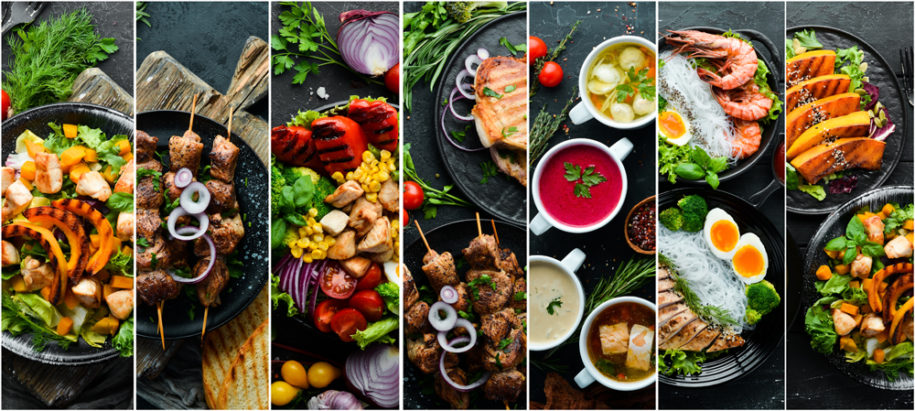Paleo, vegan, intermittent fasting, Whole 30, Keto… How do you choose the absolute best diet (for you)?
I love it when clients email me with questions. Usually, questions range from health and weight loss, re-balancing the digestive tract, cardiovascular health, sports nutrition… Looking over the questions, one particular theme emerges: Marie which “nutrition camp” do you follow?
From one:
“I’ve visited both your business and recipe website. Do you believe in ‘paleo’? Or do you believe in the standard ‘RD stuff’?”
From a long distance client:
“Your nutritional program sounds great. But, if I were to sign up for it, would I have to cut out all my carbs?”
From a production assistant for a TV program:
“I have a friend who’s vegan and she’s super healthy. I’m thinking of trying it…it’s pretty high carb. What do you think?”
Essentially they’re all asking the same thing:
What’s the “best diet”?
There is no succinct, one-line answer.
I won’t join the “one diet camp”. Sure, the human brain likes to compartment solutions. In this world of social media, blogs, and “take this supplement that worked for my sister…” we must continue to realize that we are all different.
“But … but … if I could just fit into one of these nice little nutrition boxes…”
“My sister did Keto and lost 30 pounds…”
“I felt great on a plant-based diet.”
“I feel best on a carnivore diet (as long as the meat is from pastured, wild, or grain-free animals)”
I just won’t do it: I don’t believe there’s a single, absolutely, positively, without-a-doubt, best diet for every person to follow, always, and forever.
Sue down the street, or Aunt Sally, or a book written by a celebrity promotes a particular dietary strategy and it worked for them, great. I’m forever happy for anyone who can improve their quality of life. But… does that mean it works for all? And that all the restrictions are forever?
“This is huge! I had eliminated so many foods based on allergy tests. I was afraid to go out to restaurants with my friends and family. If I cleaned my home I had to wear a mask and immediately shower (allergies, nothing to do with COVID). Being at the cabin was miserable among all the trees. Using Nutrition Response Testing and an educated approach to adding foods back, I have such a wonderful and diverse diet. There are still some things I won’t or can’t eat—it’s huge to go out with friends and not have to worry a out everything. It’s huge to hold the dog who lives with my relatives and not develop breathing problems. Thank you Marie! I have my life back.” —M.D.
Spend enough time actually working with clients—I’ve done this every day for 12 years—and you may start to feel the same way too.
We are all individuals; imagine the diversity!
- Goals: How would feeling well help you in life? This is the most important question.
- Improve immune response to not fall ill as often? Spend more time doing what you love.
- Energy to do what you love? There is a reason your energy has declined. Let’s find and fix what’s really wrong.
- Balance the digestive tract as it is “uncomfortable”? Less times leaving social company?
- Feel better about your appearance by addressing the underlying reasons for hives, acne, rashes, and other unsightly concerns.
- Body type: Some clients come to me tall and thin. Others are short and stocky. Some want to lose weight, others need to gain.
- Dietary preferences & exclusions: Some of my clients eat meat daily and feel better on a “carnivore diet” while others are exclusively vegan. Yet others already understand that certain foods make them feel unwell and have already eliminated them. And many more eliminated foods based on allergy tests; although in most cases we can take steps to repair the digestive tract and expand food options.
- Vitamin D? If we get out in mid-day sunshine (in Anchorage) we can make vitamin D nearly 2 weeks on either side of our longest summer days, June 21 solstice. Otherwise, we need to supplement vitamin D.
- Magnesium? Next up, 80-90 percent of Americans are deficient in Magnesium. Why? Because magnesium is a major component of plants and we eat far too few vegetables.
- Budget: Many of my clients are desperate to feel well and need to do so on an incredibly low budget. Perfect! Financial stress can undermine even the best nutrition. I strive with everyone to keep things simple. Even with an unlimited budget, it’s vital to respect the body’s ability to heal one layer at a time.
- Organic vs. conventional: In a similar light, I personally choose organic to give financial support to those farmers. The Environmental Working Group, professionals I’ve contributed to over the years, annually analyzes the pesticide content in produce to create “the dirty dozen” (where you should buy organic) and “the clean 15” (save money and buy conventional).
- Pastured and wild conventional: Also similarly, and perhaps more importantly, buy animal products that were raised in their natural environment. Cows fed grains (even grain finished) have an inflammatory fat profile, develop leaky gut, and their milk is high in bacteria.
- Time: Some clients love to spend time in the kitchen, love to go to the gym and/or love to be active. Others love to have premade food at restaurants. Or at least that doesn’t take hours to prepare. All of you deserve a program you can actually, really do in the time you have. That said, it does take some time to shift habits and routines—develop new—give yourself permission.
- Nutrition knowledge: Tired of looking for truth in a myriad of blogs? Whether you are a devout follower of a certain dietary practice or would like help developing your sustainable plan. There is hope and I can help. That’s why I use Nutrition Response Testing.
Were I militant about “do it this way”, I wouldn’t get results with all these diverse indivduals.
It’s all about you—as an individual!
Bread and pasta (and corn, oats, rye, rice barley, sugar…) do addict the brain. There are some foods that are irritating to most. Sugar and insulin rollercoasters cause weight gain, high blood pressure, and alter cholesterol levels. Does this mean that very low carb is best? Not for everyone!
Try things.
Every day in the gym or on Facebook I hear…
Have a protein shake after your workout (great idea but most gyms sell sugary drinks that defeat the purpose.) You might like this recipe.
While I’ll use Keto to “reset” metabolism or immune function for some clients over a short-term span of time, Research shows the low-carb/high fat Keto diet alters the microbiome in the gut if followed for too long.
The best nutritionists don’t have a single nutrition philosophy.
We meet our clients with their individual needs and consider many factors.
After all, the idea of the “Paleo diet” means eat similarly to your ancestors. Except… today it is regimented with lists of what can be included, or not, and for everyone.
This is clearly demonstrated by examining the traditional diets of various tribes and ethnic groups throughout the world.
- Our Arctic Inuit and the African Masai eat traditional diets that are very high in fat and animal products with very few vegetables. This works for them.
- Conversely, the Kitavans in the South Pacific eat traditional diets that are low in fat but very high in vegetables and starchy carbs.
- The Tokelau near New Zealand eat traditional diets that are very high in saturated fats.
What really is “Paleo”? People seeking health today often condemn certain food groups—grains, dairy foods, meat, salt, fat, sauces, sweets, nightshade vegetables… And so we should because many of these have irritated our digestive tract and inflamed our bodies.
Yes, we should eliminate irritants so we can heal. But which ones, in what order, and for how long?
It’s more like… when we changed from our heritage diet to convenience and commercial food we swapped wholesome nutrients for empty cheap fillers grown on depleted soils.

These packaged and “foods” are delivered by commercial container boats after sitting in warehouses in other countries for… who knows? Buyer beware, aside from Europe, there are few contaminant restrictions. In fact, this holds for produce where, for decades, a friend and research colleague documented the pesticides sent from the U.S. to other countries, sprayed on produce there, and then the produce was imported back into the U.S. The list of pesticides include DDT and others now not allowed to be used on American soils.
The result? Weight gain, metabolic syndrome, low energy, cravings, mood disorders, joint aches, hormone imbalances, chemical toxicity, malnutrition, more…
If you buy locally, from farmers you know, and eat traditionally, you’ll have minimal incidences of cardiovascular disease, stroke, diabetes, inflammatory obesity, etc. Crazy differences, right?
The human body is amazingly adaptable to a host of different dietary conditions. What is traditional and healthy for one, may not work at all for another. Whether you eat mostly meat or mostly veggies, mostly fat or mostly carbs, many times a day or just a few times… the main point is to listen to your body so it can tell you how it’s doing.
Rather than belong to any specific nutrition camp at all, I believe in understanding the needs of each individual human body and ensuring they are met. If I believe too strongly in any particular “nutritional religion”, I fixate on the food itself. Or my own personal way of looking at food. And I lose focus on what’s most important as a nutritionist: my clients and their individual physiological and psychological needs.
When we respect each other’s choices, and are more interested in exploring what works than we are in being right, miracles happen.
But how can such wildly different nutrition programs all lead to positive results?
When done properly, Paleo diets, plant-based diets, high carb diets, low carb diets, intermittent fasting, etc. all accomplish the following:
1. They raise nutrition awareness and attention.
I know, everyone wants to talk about the food itself — the proteins, carbs, and fats. What to eat more of and what to avoid.
Research shows that by simply paying attention to what you eat is a key factor in whether you’ll lose fat, get lean, and improve your health. Whether your attention is trained on avoiding carbs, eating more vegetables, seeking out organic / free-range food, avoiding animal foods, or avoiding “non-Paleo” food, it’s all good.
Caring more about what you’re eating is the secret to success—and can become sustainable.
2. They focus on food quality.
Paleo and low carb advocates focus on natural, free-range animal-based foods that are higher in protein, higher in fat, and are minimally processed.
Vegan and high carb advocates emphasize more natural, plant-based foods that are higher in fiber, antioxidants, and are minimally processed.
Recognize what’s common here? Pretty much every camp recommends whole, minimally processed, nutrient-rich foods. And that may be one of the most important nutrition interventions of all, regardless of the protein, carb, and fat breakdowns.
3. Focusing on quality helps eliminate nutrient deficiencies.
As we shift away from processed foods, low in nutrients that were stripped out during processing, and shift toward more whole or minimally processed foods we eat more intact nutrients.
This is huge! We often look, feel, and perform terribly when deficient in important nutrients. But within a few weeks of correcting these deficiencies, we feel totally rejuvenated. (And because the transformation is so dramatic, and people will notice, some of us we become diet zealots.)
4. Focusing on quality helps control appetite and food intake.
By consciously choosing more satisfying, higher quality foods, we almost always end up eating less total food. We feel more satisfied because the body isn’t craving missing nutrients. We lose fat, gain lean muscle, have more energy, and perform better.
And all that without counting calories!
5. They promote regular exercise.
The journey to health often causes us to pay attention to more than eating. Focusing on diet alone may actually interfere with establishing a consistent exercise routine.
Regularly mixing high and low-intensity activity dramatically improve your ability to turn the food you eat—whatever food that is—into functional tissue (instead of extra fat).
Choosing a single diet camp makes no sense for a nutritionist.
Even when dietary philosophies seem opposit on the surface, for so many of us in this commercial food world it’s what was taken out—anything with a whole foods focus can promote good health, body composition, and longevity. Again, listen to what your body is telling you.
“Marie, after years of being a dedicated Vegan, I selectively decided to add eggs from local (pastured) chickens and some fish. I can honestly tell you that reducing the carbs has helped my serious bloating and my energy is better. I hope to shift back to my vegan philosophy but, for now, I realize I just need to heal because my gut microbiome is way off. Thank you!” —VH
Which is why…
1. There’s no such thing as one, universal “best” diet.
The best diet to follow is …
… the one that’s best for you and that you’ll do.
That’s why I’m happy to help people find the best one for them, no matter their dietary preferences.
Of course, this is a big win for my clients: They get in shape doing more of the things they actually like. And a win for me: I get to help more people.
2. Most popular diets actually have a lot in common.
When done with care, attention, and a little coaching—most strategies help control appetite, improve food quality, promote exercise, and raise nutritional awareness.
Vegans can stay vegan. Paleos can stay Paleo. And you can all win.
3. Habit-based coaching is better than diet-based coaching anyway.
Long-term nutrition habits trump diet plans and “rules”. Always.
I work with my clients to built habits intelligently and sustainably. “Follow a diet” all too often means doing a full lifestyle overhaul on Day One or buying pre-made meals according to a specific plan.
If you want to follow a Paleo diet head over to OurNutritionKitchen.com where I’ve built several hundred recipes using those guidelines.
Although, Paleo does exclude beans and legume nuts (peanuts, cashews…), I find beans healthy when prepared properly. The smaller the seed, the more fiber and protein. And, they really can help you with blood sugar balance.
This is good to know if your preference is toward plant-based and you’ll find many wonderful recipes on OurNutritionKitchen.com to accommodate you.
I can help you whether you’re vegan, prefer to eat more carbs (or less), are on a tight budget, or only eat organic / free range artisan foods.
Let me listen to your needs. What you want to accomplish. How you live. How your household lives. What’s really important to you. Then let me help you create the right dietary approach for you; one that’s specific to your goals and your lifestyle.
I’m responsible for (and accountable to) my clients. You’ll “fire me” if I don’t get results (and so you should). This totally changes the game in both directions. We must have an open dialog where you can tell me what is working and where you can give me records of what you are doing and when you feel poorly (if you do).
I don’t have one fixed diet philosophy; I have a process.
That’s what my Masters in Functional Nutrition and decades of experience has trained me to do for you. Functional nutrition is a dynamic process; it involves refining diet and lifestyle, to restore optimal health. It is a conversation that we have with our bodies, where an intervention is given, and then we listen to the body to see what it says back.
If you have symptoms (feedback from the body), then there is some degree of lost function. If you want to change that, call me. There is hope and I can help.
It’s all about you.
907-222-1824



Leave a Reply
You must be logged in to post a comment.